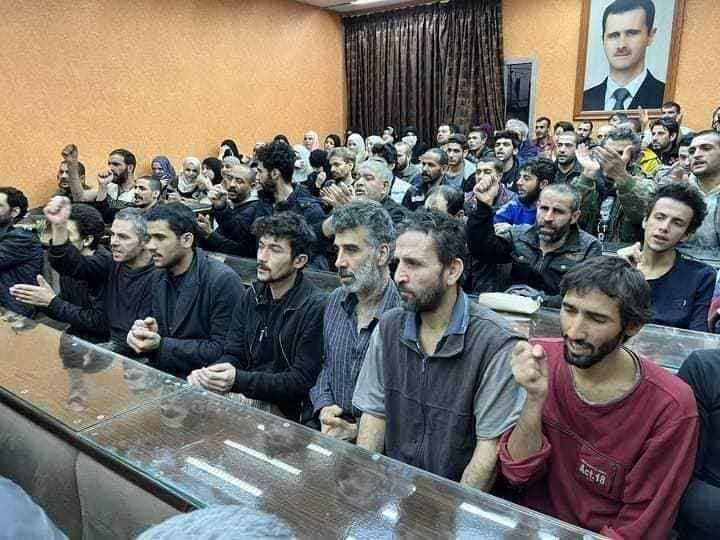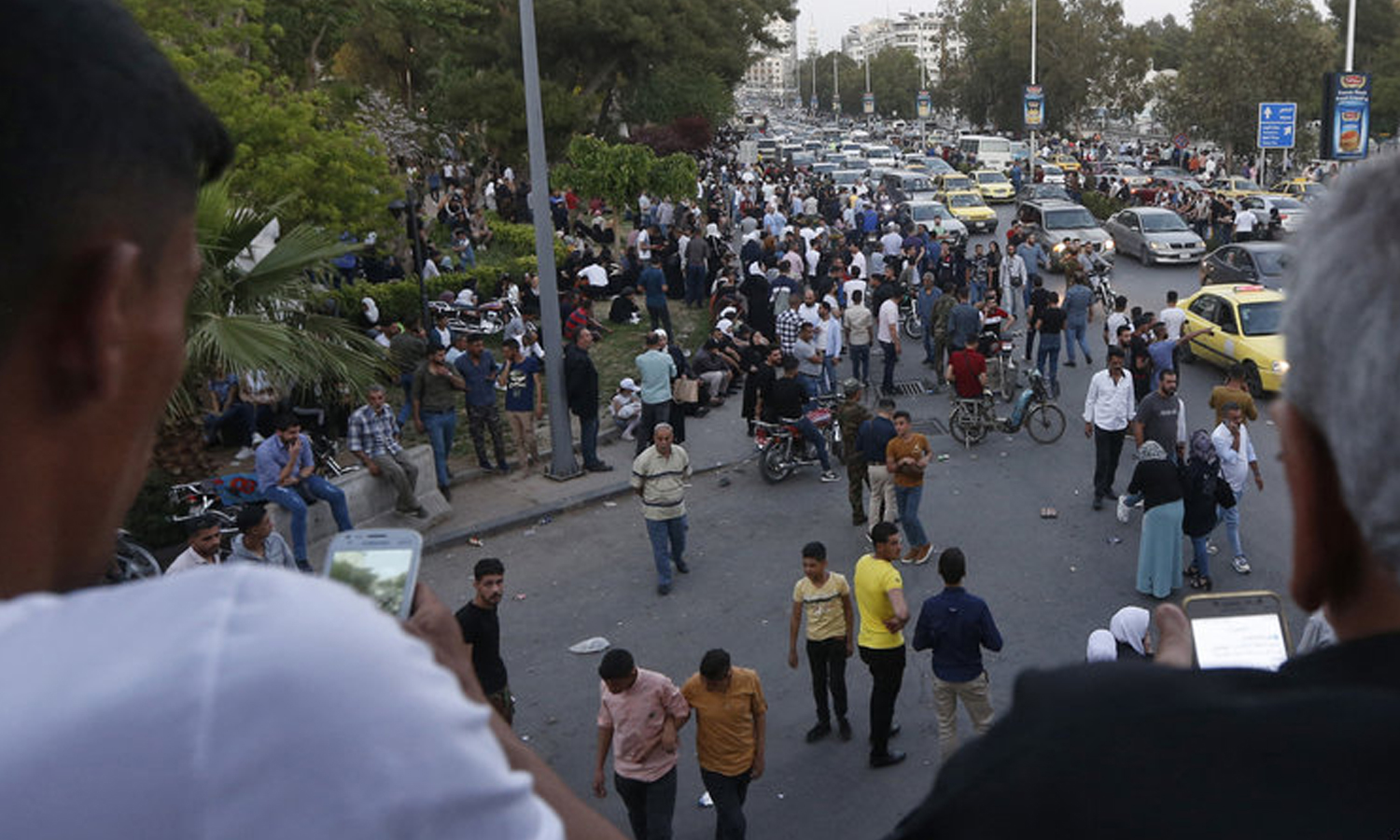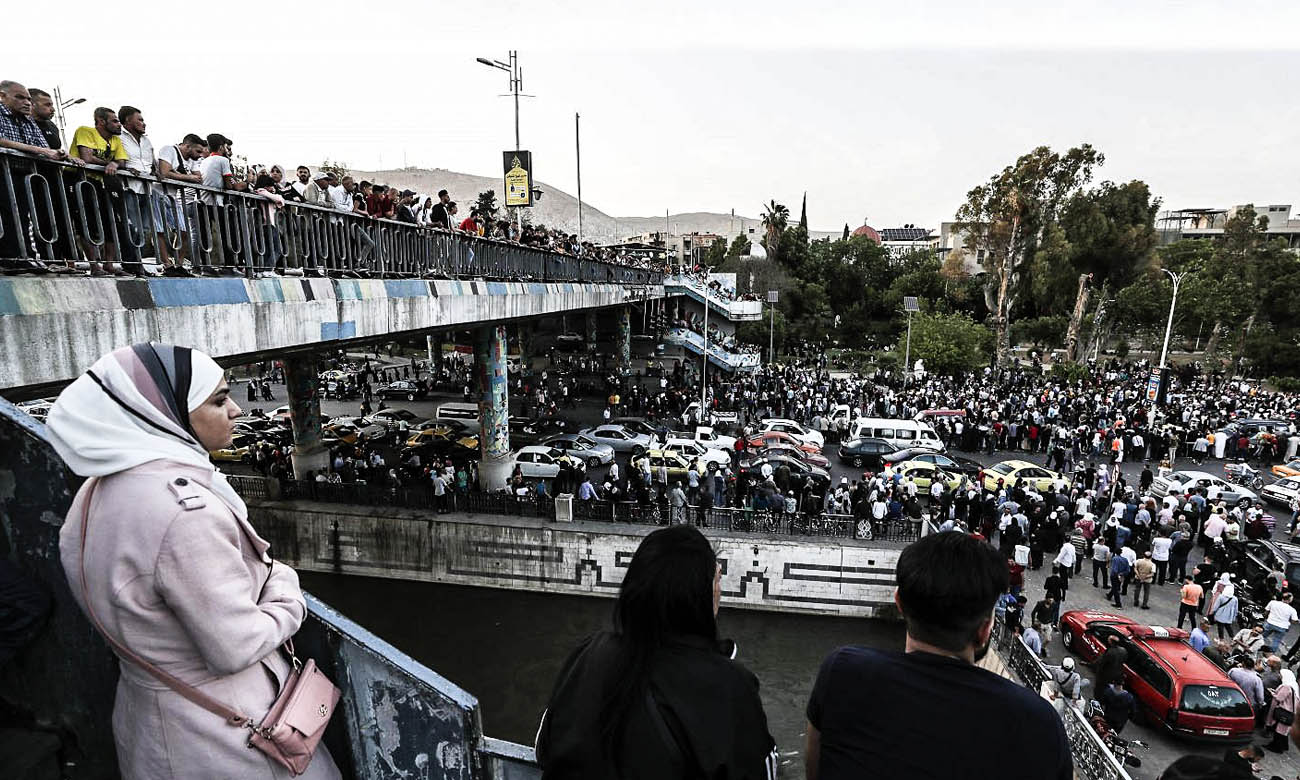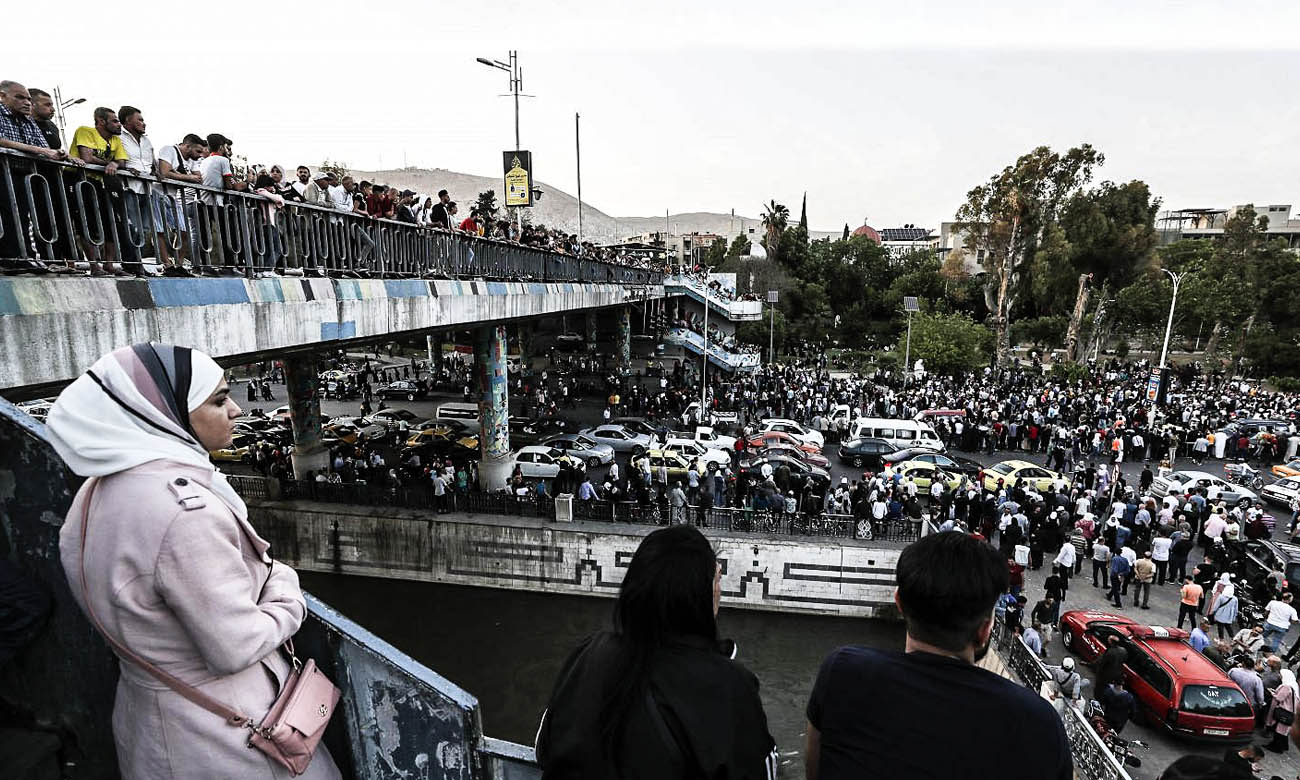Saleh Malas | Hussam al-Mahmoud | Lujain Mourad
“I knew that my son Ayham was martyred inside Damascus University, his colleague who had been arrested with him told me. They were tortured in a hall at the Faculty of Medicine, which the Syrian Students’ Union turned into a prison containing torture tools. After we paid our respects to my son, a newly-released detainee who was with my son said he was in good health, where a new searching phase began.”
In an interview with Enab Baladi, Maryam al-Hallaq, the mother of Ayham Ghazoul and the director of the Caesar Families Association, tries to highlight the painful experiences of the detainees’ families, waiting for any certain information they might receive about the fate of their loved ones detained in Syrian prisons.
The detainee’s family is a human model that belongs to a world full of obsessions and anxiety about the fate of family members with whom they shared their past, dreams, and passion for the future.
Most of the detainees who were forcibly disappeared by the Syrian regime were arrested because they tried, even for once, to express the image of life they wanted to live with dignity and freedom.
During the past days, photos of hundreds of the detainees’ families gathering under the President’s Bridge in Damascus went viral. They were waiting for prisoners who were released from the notorious Sednaya Military Prison as part of Bashar al-Assad’s general amnesty that included provisions in the Anti-terrorism law of 2012.
Since early May, people have gathered in various squares in Damascus, their faces shriveled and sullen, and their days exhausting and grueling, far from their loved ones, and this misery will not be repaid from them unless they know the fate of their sons, for they only need that.
The released detainees, who were welcomed in hot eagerness and deep groans, ended a harsh experience, the ugliness of which absorbed from their lives the strength they needed in order to return to their normal lives.
A large number of events related to the detainees’ file are still taking place in Syria, especially during the past few days, as the regime’s government released several batches of detainees in different Syrian governorates, most notably the capital Damascus.
The first detainee releases were random, characterized by chaos and a complete lack of transparency, without clarifying the numbers and names of those released. Soon, the latest releases, on 5 May, were accompanied by lists and photos of the release process in the presence of the families of detainees in the governorate buildings.
Enab Baladi is trying in its weekly in-depth article to explore the regime’s motives for issuing the recent amnesty since it is the first of its kind that links to crimes classified as “terrorist,” as well as to examine whether the presidential pardon has any human rights and political consequences at the regional and global levels.
Dreams being killed in security cells
Al-Hallaq’s son was arrested twice during his participation in the Syrian revolution, the first was on 16 February 2012. He was released in May of the same year, and the second time, he was arrested on the campus of Damascus University at the Faculty of Dentistry, where he was preparing a master’s thesis on 5 November of the same year. That time, his family received information that he was killed under torture five days after his arrest.
The searching journey for the truth about Ayham’s fate lasted for 17 months.
Al-Hallaq, who co-founded the Caesar Families Association, said, “I searched everywhere for the truth, and finally, I obtained a death certificate from Tishreen Military Hospital that my son had died of cardiac arrest only five days after his arrest.”
Although she received her son’s death certificate personally, al-Hallaq still had hope that he would be alive, to realize the dream that he had always worked to achieve, “I did not receive his body, nor even his identity, nor anything that was with him.”
Ayham had a dream of a new Syria free of al-Assad’s domination, and he played a great role in raising my awareness of what is going on in Syria through his readings, the mother says.
“He was in the tenth grade when he brought me The Shell (a famous novel that exposes the violence and brutality of the Syrian regime and another book entitled ‘Syria Assad’s Farm,’” she added.
Ayham Ghazoul participated in the demonstrations since their inception and began working at the Syrian Center for Media and Freedom of Expression to document violations, where he was arrested from the center the first time, but Ayham’s dream in his journey towards change ended when the torture photos of Caesar were leaked in 2014. Al-Hallaq said, “at that time, I realized that I had lost him and would never see him again.”

Syrians await the release of their detained relatives on the President’s Bridge in Damascus – 5 May 2022 (The Association of Detainees and The Missing in Sednaya Prison (ADMSP)
“Massacre in disguise”
The Syrian regime promoted the decree and the releases as “a tribute that Mr. President gave to the terrorists whose hands were not stained with blood.” Despite the hope this step brought to the families of the detainees, the regime’s policy turned it into a series of violations against the detainees who were left in the public streets, while the families gathered in the squares in search of their sons in a scene described by Syrians as a “massacre,” as a symbolic expression of the failure to organize the process of releasing detainees, and the humiliation of their families.
“Whatever the context in which the amnesty was placed, what the regime did to release the detainees, to humiliate the entire Syrian society, led to exposing the regime’s violations and the extent of the tragedy,” Mohammad al-Abdallah, director of the Syria Justice and Accountability Center (SJAC), told Enab Baladi, referring to the threats the residents received and the way the regime used to disperse the gatherings, using the most dangerous threat in Syria that “we can make your fate the same as the prisoner you are waiting for.”
Random release, what are the reasons?
During the first days of the release of detainees, the regime did not announce the numbers or names of people who would be included in the amnesty, as the Deputy Minister of Justice, Nizar Sedkni, said on 2 May, “there is still no specific number for those who have been released because there are many sides working on implementing the release process, but when it is finished, there will be statistics,” which is an indication of the randomness in which the Syrian regime deals with the issue of detainees.
The younger brother of one of the released detainees, Omar, 27, told Enab Baladi that his brother arrived at his home on 3 May, about ten years after his arrest, and they lived the first three years of it between hope and despair for his return, until In 2016, his family received his death certificate.
“We lived for years on the basis of the martyrdom of my brother Mohammad, my older brother married his wife to embrace his sons, and we all cried for long nights in despair of his return,” noting that despite the great joy that the family experienced upon his release, the joy was not complete due to the arbitrariness of the regime, even in documenting the deaths of detainees in its prisons.
This was not the only case that confirmed that the regime’s policy had manipulated the emotions of dozens of families, even those who had received news of the death of their children. The return of detainees whose families believed they had been killed under torture lit a spark of hope in the lives of others who had lost hope and offered condolences to their sons.
The relative of the detainee Omar, whose full name Enab Baladi withheld for security reasons, said that “since the release of the detainees, hope has returned to my family’s home in Damascus, despite the passage of ten years since the arrest of my cousin, which prompted his mother to wait in the streets for two consecutive days, perhaps to get any news about her son,” noting that any news she will receive today will bring her back to the moment when she received news of his death and that the pain of loss will be repeated in a more severe way, as he said.
Al-Abdallah said that “the Syrian regime has a desire to dilute the issue of detainees and missing persons, and until today no official number has been issued on the number of detainees,” noting that this has been the regime’s permanent policy for years to obscure issues and obliterate the “crimes” that condemn it regarding the issue of detainees and other cases.
Although the release of detainees is in the regime’s interest to polish its image, the regime has deliberately followed the same random policy to preserve the confidentiality of facts and figures that show the number of detainees in its prisons, according to al-Abdallah.
Diab Sariya, co-founder and coordinator of the Association of Detainees and The Missing in Sednaya Prison (ADMSP), confirmed to Enab Baladi that the regime benefits primarily from the absence of statistics, as this option serves the regime’s denial of the number of detainees.
Sariya added that the regime needs many years to count the number of detainees in Sednaya prison alone, pointing out that the years of detention and killing inside prisons in Syria make it difficult to count the people who were killed under torture or are still alive in detention because it became a complicated matter even for the regime.

A group of 43 persons of those released under the Presidential General Amnesty of 30 April 2022 in Aleppo’s provincial building – 6 May 2022 (Al-Watan newspaper)
Detainees file turned a regime-run business
Since the start of the arrest campaigns in Syria in 2011, hundreds of brokers and fraud gangs have been active, taking advantage of the impotence of the families who are always ready to lose anything in exchange for one piece of information that reassures their hearts of their loved ones, in light of turning most of the arrests in Syria into cases of enforced disappearance.
“The regime is benefiting from the financial spread of brokering, as it is part of the (local business) managed by the security services,” according to al-Abdallah.
The regime’s relationship with brokers is increasing in activity, coinciding with the issuance of general amnesty decrees or news of the release of detainees.
“If the extortion carried out by the brokers could reassure the people by providing real information, they could ignore all the warnings provided by the organizations and pay all the amounts required to obtain one accurate information,” al-Abdallah added.
The human rights defender believes that brokerage is systematic by the regime, explaining that out of every thousand cases, the regime can release five cases to serve a fraud gang by blackmailing the families emotionally and pushing them towards the broker responsible for the release process to try to help their sons.
For his part, Sariya recommended that the families not be drawn into the gangs that have been very active during the past few days, stressing that no one will be able to add the names of the detainees to the list of persons covered by the amnesty.
In 2021, the ADMSP launched a guide to protect against fraud and financial extortion for the families of detainees and forcibly disappeared persons.
The guide consists of a 33-page booklet that presents the most prominent methods and means used by fraud and extortion gangs, security men, and some lawyers and mediators inside Syria to extort the families of detainees financially and forcibly disappeared persons in exchange for providing or forging information and documents about their detained or forcibly disappeared sons and loved ones.
It also contains some ideas and tips that can help families and workers on the issue of arrest and enforced disappearance in detecting and paying attention to fraud and forgery.
The association launched an emergency response campaign to respond to the inquiries of the detainees’ families, provide psychological support and help in the search process, and provide advice and directions during the question about the detainee or the forcibly disappeared person.
To avoid extortion and deception during the current circumstances. They can contact the ADMSP at any time, 24 hours a day, on the following numbers:
- The Family Center for psychological support services 00905387240727
- The Documentation Team to obtain support and avoid fraud or inquire about a detainee 00905389367364
Unprecedented,
Does General Amnesty apply to prisoners of conscience?
At a time when there is no evidence of the seriousness of the new general amnesty decree, the step of releasing detainees is an important matter and a definite demand by all Syrian and international human rights organizations.
The importance of the decree lies in the fact that it deals with crimes committed under the anti-terrorism law no. 19 of 2012. In the same year, al-Assad ratified law no. 22 establishing the Anti-Terrorism Court to rule that law.
The Syrian regime has used the anti-terrorism law and its specialized exceptional court against human rights defenders and other peaceful activists who are being tried on charges of promoting terrorist acts, according to the lawyer Al-Mutassim Al-Kilani.
The decree, like previous general amnesty decrees, did not require the surrender of the same person within a specified period, nor did it require the payment of fines or compensations awarded to the state or the pardon of the aggrieved party.
But at the same time, the new amnesty did not address crimes against state security in the Syrian Penal Code and also did not include all prisoners of conscience or wanted opponents who are exiled outside Syria.
This crime is not committed against the state as a person of internal law, as it does not aim to undermine its independence or sovereignty or threaten the integrity of its lands, but rather aims to rise up against the organs of government, rebel against the institutions of power established under the Constitution, or make a change in the state and the rules stipulated by the Constitution to determine the form of government and the principles of its exercise.
As for those who are being tried before the terrorism court, their relatives can refer to the court, as for those arrested before the civil court and security branches, they cannot do that.
Al-Kilani told Enab Baladi that the courts specializing in terrorism are based in Damascus, and the court is not bound by the rules stipulated in the legislation in force, in prosecution and trial (it is not bound by the rules stipulated in the Code of Criminal Procedure).
All terrorism cases pending before all courts are transferred to it according to their current status, he added.
Munir al-Faqeer, a human rights researcher at the Omran Center for Strategic Studies, told Enab Baladi that the regime always works to establish sovereign moves related to the file of detainees outside the scope of any consensual political solution with the parties to the Syrian conflict, in order to send a clear and direct message to all parties that this issue is in the hands of the regime only, and there is no willingness to give it up.
Al-Faqeer explained that the released have been detained for a few years, and most of them are from the regime-held areas, who do not pose any danger to the Assad power, whether politically, legally, or militarily.
The release of everyone is important, but those released do not have a declared political position and did not participate in a dangerous activity against the regime and its security services, and those who were seriously influencing the regime until now, no one has escaped from them or were killed under torture, according to al-Faqeer.
The researcher explained that a large part of the activists are sentenced under (Article 305) of the Syrian Penal Code, which states that carrying out a terrorist act that led to the killing of a person, even indirectly, requires execution or imprisonment for a period of 15 to 20 years if the act does not lead to death.

A number of those released under the Presidential General Amnesty in Damascus countryside’s provincial building – 5 May 2022 (Al-Baath newspaper – Hama office)
What is the difference between arrest and disappearance?Detention, according to Amnesty International, is defined as the detention of persons without a legitimate reason or without legal process, which usually precedes the disappearance. The United Nations International Convention for the Protection of All Persons from Enforced Disappearance aims to prevent enforced disappearances defined in international law. Article 2 of the Convention defines it as the arrest, detention, abduction, or any other form of deprivation of liberty by state agents, persons, or groups of individuals acting with the authorization, support, or consent of the state, followed by a refusal to acknowledge the deprivation of liberty or concealing the fate or whereabouts of the disappeared person, which deprives him of the protection of the law. It is the responsibility of the state to take appropriate measures to investigate the actions specified in Article 2 by persons or groups of individuals acting without the permission, support, or approval of the state and to bring those responsible to justice. |
Near and long-term goals
The general amnesty for “terrorist crimes” was accompanied by a number of regional variables, most notably the high level of political discourse calling for the return of Syrian refugees to Syria, as it is “safe,” in addition to continuous complaints about the “burdens” of receiving them.
Voluntary return from Turkey
Turkish President Recep Tayyip Erdogan clarified on 3 May his country’s efforts to return one million Syrian refugees to 13 regions in the cities of Jarablus, al-Bab, Tal Abyad, and Ras al-Ain, in cooperation with the local councils in those areas.
Erdogan’s statements, which came during a video call during the ceremony of handing over the keys to prefabricated houses in Idlib, in coordination with the Disaster and Emergency Management Authority (AFAD), and in the presence of the Turkish Interior Minister, Süleyman Soylu, were preceded by sharp criticism from politicians of the Turkish opposition parties, which dealt with the Syrians going to “liberated areas” to spend the Eid holidays, and then return again to Turkey, which means that Syria, according to the vision of these politicians, is ready to receive refugees.
In turn, the Turkish Immigration Management canceled the Eid holidays on 20 April, followed by frequent official Turkish statements talking about the “voluntary return” of one million Syrian refugees, with the approach of the Turkish elections scheduled for next year.
Among the most prominent of these statements was what was stated on 5 May by the Turkish Interior Minister, who confirmed Ankara’s readiness to build about 100,000 homes in Idlib governorate, and to hand them over by the end of this year, explaining that financing home projects with an area of each 40, 60 or 80 m², came entirely from international charitable organizations.
Three million, 712,47 Syrian refugees reside in Turkey under “temporary protection,” according to statistics from the General Directorate of the Turkish Immigration Presidency issued on 28 April.
Lebanon’s inability to bear “displaced file”
In light of the deteriorating economic and living situation in Lebanon, and on the same day the general amnesty decree was issued, the Lebanese Minister of Social Affairs, Hector Hajjar, stated that his country had informed the UN of its inability to bear the file of the Syrian refugees.
Hajjar indicated that he met with the representative of the High Commissioner for Refugees in Lebanon, Ayaki Ito, to hand him the official position of the Lebanese government following the meeting of the ministerial committee in charge of discussing the issue of the displaced.
About 900,000 Syrian refugees reside in Lebanon, 89 percent of whom live below the extreme poverty line in a 34 percent increase from 2019, according to a report by the United Nations High Commissioner for Refugees (UNHCR) on the vulnerabilities of Syrian refugees for 2020.

Hundreds of people await the release of their detained relatives under the President’s Bridge in Damascus – 4 May 2022 (AFP)
Can al-Assad’s amnesty distract Tadamon massacre shock?
In addition to the dissatisfaction with the situation of Syrian asylum in some neighboring countries, the general amnesty took from the Tadamon massacre a time background that appeared in public only three days before al-Assad’s decree, as The Guardian revealed a massacre committed by the Syrian regime forces on 16 April 2013, in the Tadamon district of Damascus, which resulted in the killing of 41 people, the burning of their bodies, and their burial in a mass grave.
The massacre has lost part of its shocking impact in front of the gatherings of people who were waiting for the release of detainees from the regime’s prisons and detention centers, but al-Abdallah, the director of the Syria Center for Justice and Accountability, said there is no link between the massacre and the general amnesty decree.
He explained that preparing for the decrees requires weeks of prior work, determining the number of people who can be removed, looking at their charges, and transferring them between detention centers and prisons, pointing out the regime’s indifference to this type of documenting killing video in front of thousands of recordings and previous scandals, including “Caesar” photographs.
Media contempt and wordplay
In front of thousands of citizens gathering under the President’s Bridge in Damascus, waiting for their sons and relatives detained in the regime’s prisons, the pro-regime media coverage was absent, as explained by the assembled crowds not far from the headquarters of the state TV.
The coverage from Damascus was limited to a video report published by the local Sham FM radio station on 4 May, before it was deleted from its social media platforms.
The report surveyed the opinions of the detainees’ families, who criticized the chaotic release conditions and the long hours they spend waiting on the roads, in addition to the absence of name lists for the detainees, so that some people are not waiting in vain, especially since the hope of seeing their detained sons is what keeps them on the streets.
The report, which lasted for approximately five minutes, carried a lot of complaints on the part of the detainees’ families, which was preceded by phrases of supporting the regime, but it was followed by inquiries about the fate of sons and brothers who have been missing for years in the basements of prisons without knowing their whereabouts, the charges against them, and whether they were ever prosecuted.
The Sham FM report was removed from the digital media outlets without explaining the reasons for its deletion by the radio since the detainees’ families assured that their sons are not terrorists and they have not committed a crime or misdemeanor but, in fact, they were forcibly disappeared for a period ranging between seven and 11 years.
According to the Sham FM report, some detainees’ families have more than one detainee from the same family. One of the people said his father was arrested by the regime 11 years ago, and his brother was arrested eight years ago.
On the level of news coverage, the local al-Watan newspaper and media outlets and networks close to the regime reported the release of the detainees, with a cosmetic change in their description, considering them as arrested and not detained.
The absence of the security decision to film what is happening, at least in the first batches of detainees, made the official media absent from the course of an event of this magnitude, and the echo achieved by the Sham FM report came more than expected, as the authority’s thanks went beyond demanding the detainees, which prompted the radio to delete it.
if you think the article contain wrong information or you have additional details Send Correction
النسخة العربية من المقال
-
Follow us :













 Hundreds of people await the release of their detained relatives under the President’s Bridge in Damascus - 4 May 2022 (AFP)
Hundreds of people await the release of their detained relatives under the President’s Bridge in Damascus - 4 May 2022 (AFP)





 A
A
A
A
A
A








 More In-Depth
More In-Depth